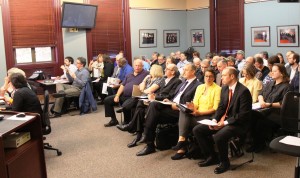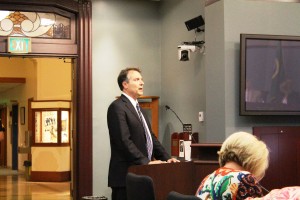The second ordinance dealt with prohibiting people from panhandling at certain intersections within the Everett city limits. This ordinance would prohibit people begging or panhandling within 60 feet of an intersection where there is a lighted traffic signal or a traffic median. A city traffic engineer told the city council it was an issue of traffic safety with the intent to keep drivers or passengers of vehicles from passing things to or from pedestrians outside of the vehicle. It would not stop people from holding informational signs at those intersections. The testimony again was emotional with people speaking both for and against the ordinance. Councilman Paul Roberts said he’d be willing to look at the panhandling issue in the future but couldn’t support it at this time as it felt like the city was forcing police powers on those who are unfortunate. The vote was 4 -2 to reject the panhandling prohibition.
Alcohol Impact Area Passes, Panhandling Ordinance Fails at Marathon Everett City Council Meeting
It was a long and sometimes very emotional meeting of the Everett City Council Wednesday night. A standing room only crowd listened to briefings on the 2015 budget, the city’s funding of Capital Improvement Projects and a consultant’s plan to change the way city employees get their healthcare. That alone would have made the meeting longer than most but then add consideration of two controversial ordinances and the meeting stretched to four and a half hours. Even the live Everett TV broadcast automatically cut off at 10:30pm and switched to “Pet of The Week” causing one Everett resident to get off his couch and come down to the meeting to see how voting on the panhandling ordinance was going to turn out. Originally there were three ordinances that were causing all of the attention. One, that would have prohibited sitting or laying on the sidewalk on Smith Street near the Everett Gospel Mission was pulled from consideration after an outcry from people on the Everett Streets Initiative who said that it did not come from their meetings and did not want it confused with the work they had been doing.
That left two ordinances. The first was for an Alcohol Impact Area that runs through most of downtown as well as along Broadway to the north and Evergreen Way to the south. Basically the ordinance creates an Alcohol Impact Area in the commercial areas of the city which asks for sellers of certain listed alcoholic products to voluntarily stop selling those products in their stores. The stated goal is to decrease the level of chronic public inebriation and illegal activity associated with the sale and use of alcohol. Merchants would be asked to voluntarily stop selling the products and after six months the police department would issue a report on whether the voluntary actions were working and if not, then the Washington State Liquor Board would be asked to place mandatory restrictions on stores within the boundaries of the Alcohol Impact Area. After hearing public testimony from people on both sides of the issue, the city council voted 4 -2 to implement the law and look to see if the voluntary nature of the ordinance and the data gleaned from it would lead to further actions in six months.






April 15, 2015
Everett, Everett Government